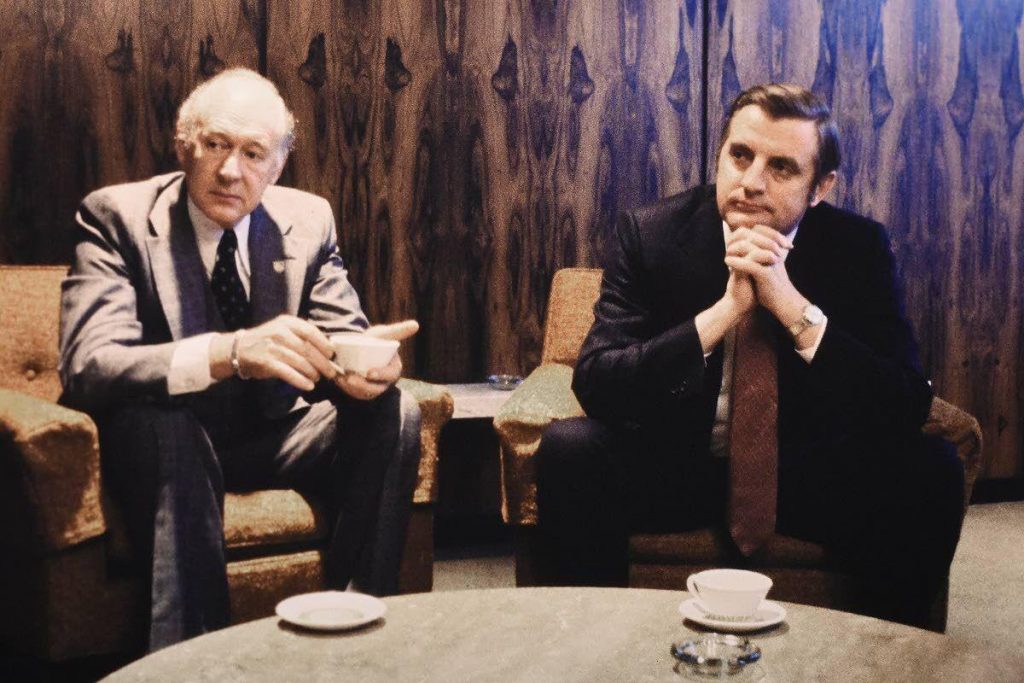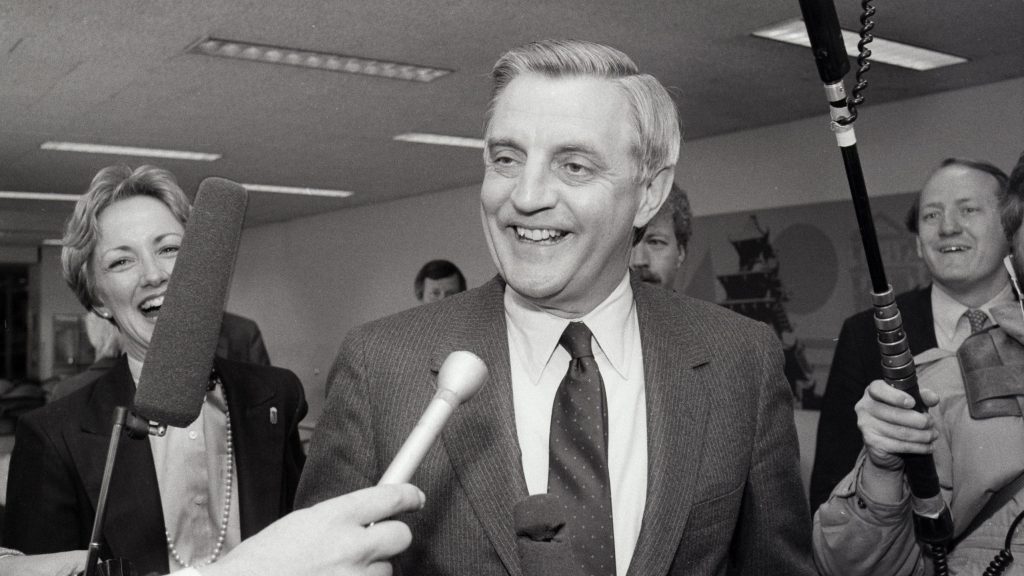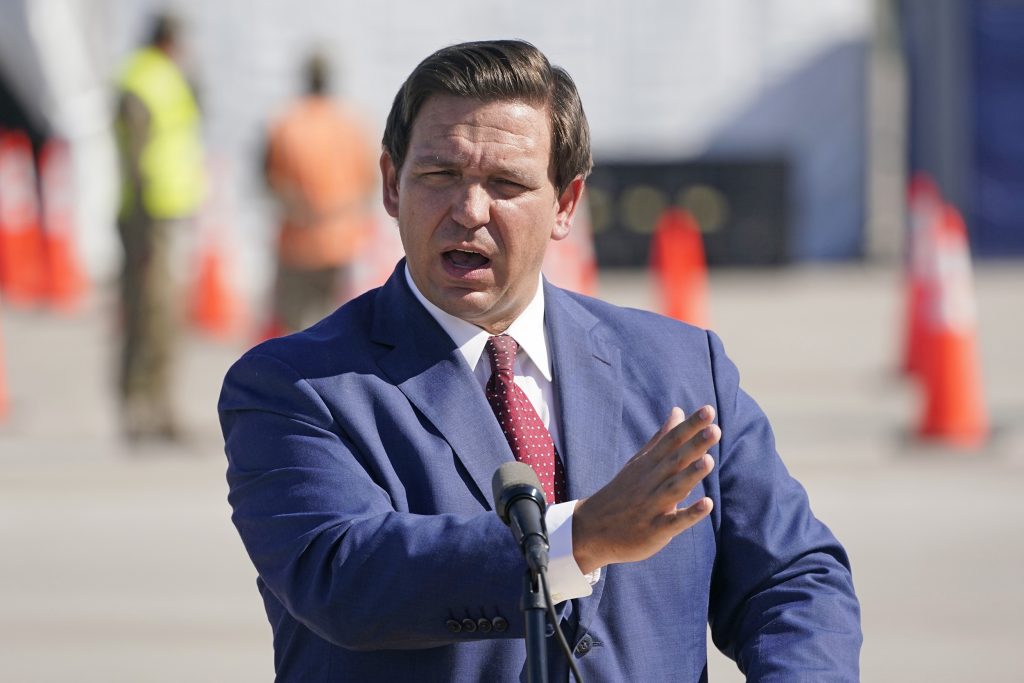In a political age too often dominated by performance outrage and petty grifting where conspiracy theories shoulder out known facts it can be difficult to remember that we once had more people than not – in both political parties – committed to the messy, but essential work of politics. Let us praise one of them.
On only one occasion did I have the pleasure of spending time in the company of Walter F. Mondale, the former Minnesota senator, vice president and U.S. ambassador to Japan. The occasion was a big public policy conference in Boise in 2003 jointly sponsored by the Andrus Center for Public Policy and the Frank Church Institute. The world was still reeling from the September 11, 2001 terror attacks on the World Trade Center and the Pentagon and U.S. troops were in combat in both Afghanistan and Iraq. It was a dangerous and unprecedented time, but the timing of the gathering focused on “freedom and secrecy” was close to perfect and we drew a big crowd and an impressive line-up of experts.

Slade Gorton, the former Washington senator, came to the gathering fresh from his role on the special commission that investigated the 9-11 attacks. Gorton made his first public comment about the investigation at the conference. The distinguished Washington State University historian and Frank Church biographer LeRoy Ashby explained the legacy and importance of the Idaho senator’s investigation of the nation’s intelligence agencies more than 20 years earlier. A former CIA director, federal judges, the lawyer who represented John Walker Lindh, the so called “American Taliban” and Dave Broder, the Washington Post reporter all participated.
Mondale, his flat Minnesota voice strong and authoritative, was the eloquent star of the show, both for what he said, which is still memorable and important all these years later, and also because of his warmth, decency and commitment to democracy. Mondale came to Idaho not as duty, but as a favor to both the memory of Church and to acknowledge his long-time friendship with former Governor Cecil Andrus.
Mondale, before his death this week at 93, was one of the last remaining direct ties to Church’s historic investigation of the CIA, FBI and other intelligence agencies. That investigation disclosed, among other things, evidence of assassination plots against foreign leaders, illegal spying on American citizens, including FBI spying on Dr. Martin Luther King, Jr. and, as Mondale noted, “that every president from Roosevelt to Nixon had pressed these secret agencies to go beyond the law. This was a bipartisan problem.”
While acknowledging that even in a democracy there are some secrets that must be kept, Mondale reminded the audience, and heads nodded all around, that Americans should never “underestimate the lengths administrations of either political party will go to protect themselves from public disclosure of erroneous, unethical, or illegal behavior — or just plain embarrassment. The instinct for self-protection is often disguised in the name of national security.”
Mondale, as Bloomberg columnist Jonathan Bernstein wrote this week “belonged to a generation of outstanding liberal Democratic senators, serving from 1965 until he assumed the vice presidency in 1977. Birch Bayh, Frank Church, Fred Harris, Ted Kennedy, Ed Muskie and others took the job seriously, legislating and performing oversight. (They were joined by a very talented group of moderate and conservative Democrats, and a similarly excellent group of conservative, moderate and even liberal Republicans. It was a very good era for the Senate.)”
It was indeed a good era for the Senate, not perfect by any means, but a vast improvement over the many grubby political strivers – Ted Cruz, Josh Hawley and Rand Paul come easily to mind – that dominate the Senate today. Beyond performing for two-minute cameos on Fox News, the typical Republican senator today inhabits a policy-free zone where faux anger and manufactured grievance substitute for any agenda that might actually address a national priority.
Mondale inhabited a wholly different political world. In addition to his work with Church to bring oversight to the intelligence community, Mondale was the key driver in defeating a filibuster and passing a landmark fair housing bill in 1968, a political and legislative accomplishment that still provides the basis for prohibiting discrimination in the rental or sale of housing nationwide. Mondale’s political skill helped secure bipartisan support for the legislation. Idaho’s bipartisan Senate delegation, the liberal Church and conservative Republican Len Jordan, supported the fair housing legislation that was passed in the wake of the murder of Dr. King.
Jonathan V. Last, a conservative who knows his political history, remarked that Mondale was long considered a political “punchline” due to the landslide blowout he suffered at the hands of Ronald Reagan in 1984, a humbling defeat that Mondale accepted with good humor and genuine grace.

“It’s funny to think, “ Last wrote this week, “but Mondale came from a day where most national politicians had served in the military and not all of them—not even many of them—were products of the Ivy League.
“His father was a minister. His mother a music teacher. He graduated from the University of Minnesota and then enlisted in the Army. He wasn’t a war hero or a super soldier: Just a normal middle-class American who served his country honorably for a couple years.
“He went to law school and had politics in his blood.”
You don’t have to agree with Walter Mondale’s policy ideas to acknowledge, as his biographer Finlay Lewis wrote, that he “never emulated the crude, politico macho of Lyndon Johnson and despised Nixon’s brand of partisan hardball.” Mondale’s toughness was of a different, better type. “It is a toughness,” Lewis observed, “born of an understanding that progress, even in minute, incremental steps, is still progress.”
In our fraught and fractured political times, it bears remembering – and the passing of Fritz Mondale is an appropriate reminder – that there have been times when we had better people in politics and better outcomes, too. He was no punchline, but the first major party candidate to have a woman as a running mate and a model of vice presidential influence that every successor has followed.
“It is impossible to view his life as anything other than a beautiful, quintessentially American story,” Jonathan Last wrote of the Methodist preacher’s kid from Ceylon, Minnesota. We need some role models right now and the Senate needs some members like Walter Mondale.
—–0—–
Additional Reading:
Some other items you may find of interest…
Would the Governor’s Signature Match?
Some great old fashioned journalism here from the Tampa Bay Times.
Perhaps you’ve read about the efforts of the Florida governor, Ron DeSantis to force what he says would be better enforcement of ballot integrity laws by more efforts to verify voter’s signatures.

“Some election officials say limiting signature samples could make it harder to authenticate the identities of thosewho voteby mail, perhaps leading to more rejected ballots. Signatures change over time, they say, and are often affected by the choice of pen, the writing surface, fatigue or a person’s health.
“DeSantis’ own John Hancock has undergone a transformation during his time in government, as demonstrated by 16 of his signatures compiled by the Tampa Bay Times from publicly available sources between 2008 and now.”
Holding the politician to account for his own idea by showing how it would apply to him.
Bravo. Read the story here.
New Russia Sanctions Resolve a Mystery That Mueller Left Unanswered
It seems like ancient history, but…we now know that Donald Trump’s one-time campaign manager Paul Manafort really did give the campaign’s sensitive and secret 2016 polling information to a man known to be a Russian intelligence agent. From the excellent Lawfare blog at the Brookings Institute.
“Both the Mueller report and the Senate investigation established that Trump campaign manager Paul Manafort had passed that sensitive information to Kilimnik—but only now, years later, has the Treasury Department unveiled what Kilimnik did with it. With President Trump no longer in office, the development has attracted less excitement than it might have during the era of constant outrages about Trump’s friendliness with the Russian government and the former president’s attempts to hamstring investigations into his willingness to accept foreign help. But the Kilimnik news is worth paying attention to. As the New York Times put it, the Treasury Department’s press release provides ‘the strongest evidence to date that Russian spies had penetrated the inner workings of the Trump campaign’ in 2016.”
Thanks for reading. All the best.
